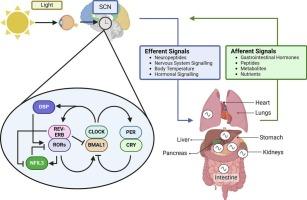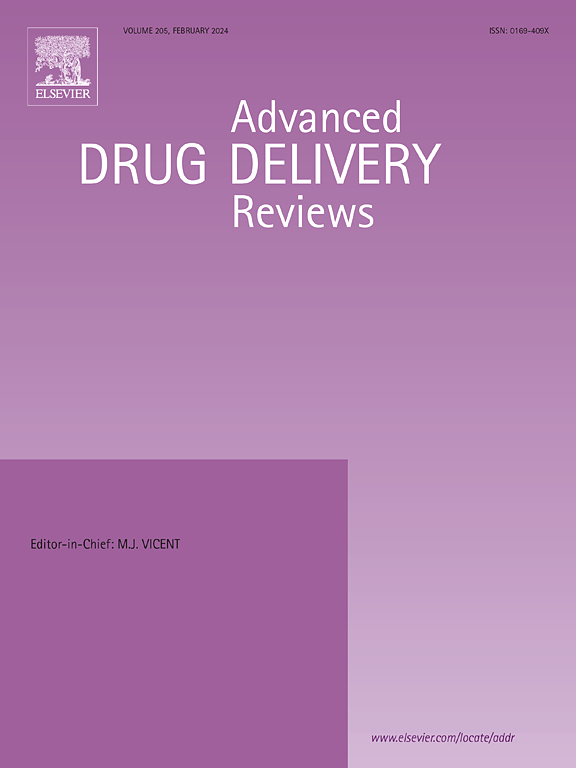分子生物钟:从基本机制到神经疾病的治疗前景
IF 17.6
1区 医学
Q1 PHARMACOLOGY & PHARMACY
引用次数: 0
摘要
昼夜节律是所有生命形式的内在生物过程,由分子钟控制,组织生理和行为周期,使其与24小时的光暗周期保持一致。这些节律的紊乱与过多的神经系统疾病有关,并影响认知和代谢功能。这篇综述为控制生物钟的遗传和分子机制提供了一个清晰的概述。它侧重于核心时钟反馈回路,所涉及的途径以及这些机制是如何调节的。我们将探讨外周组织中的时钟如何与视交叉上核同步,以及这是如何通过神经元和体液途径实现的。此外,我们还讨论了昼夜节律失调如何导致神经系统疾病以及针对昼夜节律机制的潜在治疗方法。了解昼夜节律失调的机制有助于深入了解疾病病理和潜在的治疗方法。针对昼夜节律机制的干预措施,如基因和药物输送系统,有望恢复节律并减轻神经系统症状。这篇综述整理了目前关于昼夜节律生物学及其在神经功能障碍方面的应用,为潜在的时间治疗干预提供了基础。本文章由计算机程序翻译,如有差异,请以英文原文为准。


The molecular circadian clock: From fundamental mechanisms to therapeutic promise in neurological disorders
Circadian rhythms are intrinsic biological processes in all forms of life, governed by a molecular clock, organising physiological and behavioural cycles to align with a 24-hour light–dark cycle. The disruption of these rhythms has been linked to a plethora of neurological conditions and impacting cognitive and metabolic functions.
This review offers a clear overview of the genetic and molecular mechanisms that govern the circadian clock. It focuses on the core clock feedback loops, the pathways involved and how these mechanisms are regulated. We explore how clocks in peripheral tissues are synchronised to the suprachiasmatic nucleus and how this is achieved through neuronal and humoral pathways. Additionally, we discuss how dysregulation in circadian rhythms contribute to neurological conditions and potential therapeutic treatments targeting circadian mechanisms. Understanding the mechanisms of circadian dysregulation provides insight into disease pathology and potential therapies. Interventions targeting circadian mechanisms, such as gene and drug delivery systems, show promise to restore rhythms and mitigate neurological symptoms. This review collates current knowledge on circadian biology and its applications addressing neurological dysfunctions, providing a foundation for potential chronotherapeutic interventions.
求助全文
通过发布文献求助,成功后即可免费获取论文全文。
去求助
来源期刊
CiteScore
28.10
自引率
5.00%
发文量
294
审稿时长
15.1 weeks
期刊介绍:
The aim of the Journal is to provide a forum for the critical analysis of advanced drug and gene delivery systems and their applications in human and veterinary medicine. The Journal has a broad scope, covering the key issues for effective drug and gene delivery, from administration to site-specific delivery.
In general, the Journal publishes review articles in a Theme Issue format. Each Theme Issue provides a comprehensive and critical examination of current and emerging research on the design and development of advanced drug and gene delivery systems and their application to experimental and clinical therapeutics. The goal is to illustrate the pivotal role of a multidisciplinary approach to modern drug delivery, encompassing the application of sound biological and physicochemical principles to the engineering of drug delivery systems to meet the therapeutic need at hand. Importantly the Editorial Team of ADDR asks that the authors effectively window the extensive volume of literature, pick the important contributions and explain their importance, produce a forward looking identification of the challenges facing the field and produce a Conclusions section with expert recommendations to address the issues.

 求助内容:
求助内容: 应助结果提醒方式:
应助结果提醒方式:


